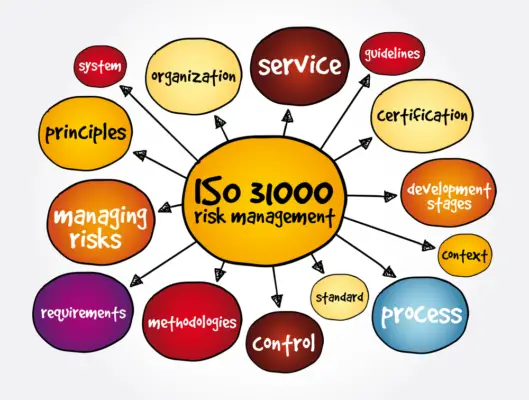ISO 31000 is an international standard for Risk Management that provides principles, a framework, and a process for managing risk. It can be used by any organization regardless of its size, activity, or sector. The standard was first published in 2009 by the International Organization for Standardization (ISO) and updated in 2018.
Key components of ISO 31000 include:
Principles: The standard outlines eleven principles for effective risk management, including the need for risk management to create value, be an integral part of all organizational processes, and be tailored to the organization’s needs.
Framework: The standard provides a framework for managing risk, which includes understanding the organization and its context, articulating risk management commitment, designing a risk management framework for the organization, implementing the risk management framework, evaluating the risk management framework, and improving the risk management framework.
Process: The standard outlines a systematic process for managing risk, which includes communication and consultation, scope, context and criteria, risk assessment, risk identification, risk analysis, risk evaluation, risk treatment, recording and reporting, monitoring and review, and continual improvement of the risk management process.
ISO 31000 is not intended for certification but guides internal or external audit programmes. Organizations using it can compare risk management practices with an internationally recognized benchmark, providing sound principles for effective management and corporate governance.
It is aimed at helping organizations achieve an appropriate balance between maximizing opportunities and gains while minimizing losses.
This article will discuss the benefits of ISO 31000 and the role of the BSI and the Office of the Tasmanian Economic Regulator in implementing the standard.
Furthermore, this article will provide an overview of the risk management guidelines outlined in ISO 31000.

What is ISO 31000?
ISO 31000 is an international standard for risk management that provides comprehensive principles and guidelines for risk analysis and assessment and helps organizations manage risks effectively to balance opportunities and minimize losses.
Developed by the International Organization for Standardization (ISO), the standard applies to most business activities including planning, management operations, and communication processes.
It helps boost health and safety performance, establish a strong foundation for decision-making, and encourages proactive management in all areas. The standard allows organisations to customize the risk management strategy to fit their needs.
This helps to improve operational efficiency, governance, and stakeholder confidence while minimizing losses.
It also builds stakeholder confidence in the use of risk techniques, as well as improving management system performance and resilience. Organizations can reap the benefits of risk management by responding to change effectively and protecting the business as it grows.
The Australian and New Zealand Standard AS/NZS ISO 31000 guides public, private, or community enterprises, groups, and individuals to achieve better decision-making and identify opportunities and threats.
The value from uncertainty and variability, pro-active management, effective allocation and use of resources, improved incident management and reduction in loss and the cost of risk, improved stakeholder confidence and trust, improved compliance with relevant legislation, and better corporate governance. BSI provides services for ISO 31000 upon request for a quote.
Benefits and Goals
Implementing AS/NZS ISO 31000 provides numerous benefits and goals, such as improved operational efficiency, governance, and stakeholder confidence while minimizing losses.
The benefits and goals of implementing ISO 31000, the international standard for Risk Management, are numerous and can significantly impact an organization’s ability to navigate risk effectively. Some of the key benefits and goals:
Improved Decision-Making: ISO 31000 helps organizations identify, assess, and manage risks, leading to more informed decision-making. This can result in better allocation of resources, improved planning, and overall better outcomes.
Increased Efficiency: By providing a straightforward approach to risk management, ISO 31000 can help organizations identify potential threats and opportunities, leading to more efficient operations and reduced waste.
Enhanced Risk Management: ISO 31000 provides a systematic approach to managing risk that applies to all risks (financial, health and safety, operational, environmental, etc.). This can lead to improved risk management practices and a better understanding of risk across the organization.
Improved Stakeholder Confidence: By adopting an internationally recognized risk management standard, organizations can increase the confidence of stakeholders, including customers, employees, and investors.
This can improve reputation, increase trust, and potentially more business opportunities.
Compliance with Legal and Regulatory Requirements: ISO 31000 can help organizations identify and manage legal and regulatory risks, helping to ensure compliance and avoid potential fines and penalties.
Creation of a Proactive Culture: Implementing ISO 31000 can help create a proactive culture focused on prevention rather than reaction. This can lead to improved resilience and the ability to respond effectively when risks materialize.
Enhanced Communication: The standard promotes the involvement of all stakeholders in the risk management process, which can lead to improved communication and coordination across the organization.
The ultimate goal of implementing ISO 31000 is to create an organization that can better understand and manage risk, leading to improved decision-making, increased efficiency, and enhanced stakeholder confidence.
Risk management is an integral part of any organization, and ISO 31000 helps organizations to effectively manage risks to achieve an appropriate balance between opportunities and gains.
The standard provides comprehensive principles and guidelines for risk analysis and assessment which can be applied to most business activities, such as planning, management operations, and communication processes.
ISO 31000 is a non-auditable standard that helps organisations gain value from uncertainty and variability. It also provides guidance for proactive management, effective allocation and use of resources, improved incident management and reduced loss and the cost of risk.
The standard also helps to improve health and safety performance, establish a strong foundation for decision-making, and encourage proactive management in all areas, further improving governance and stakeholder confidence.
It also helps improve stakeholder confidence and trust, compliance with relevant legislation, and corporate governance.
The British Standards Institute (BSI) provides services for ISO 31000. It offers a broad portfolio of business solutions other than NSB activity that can help businesses to improve results through Standards-based best practices.
Risk management is essential for any organization. Implementing AS/NZS ISO 31000 allows for improved decision-making, identification of opportunities and threats, the value from uncertainty and variability, pro-active management, effective allocation and use of resources.
Improved incident management, reduced loss and the cost of risk, improved stakeholder confidence and trust, improved compliance with relevant legislation, and improved corporate governance. It is important to note that the standard is not industry or sector specific and can be customized to any organization.
The total cost of the standard is AUD 129.95.
Risk Management Guidelines
AS/NZS ISO 31000 provides guidelines for managing risk faced by organizations in a comprehensive and customizable manner that is not specific to any industry or sector. The standard offers a common approach to managing any type of risk, whether operational, strategic, or financial.
It guides better decision-making, identification of opportunities and threats, and gaining value from uncertainty and variability. The standard also provides guidance for pro-active management, effective allocation and use of resources, improved incident management and reduction in loss and the cost of risk, improved stakeholder confidence and trust, improved compliance with relevant legislation, and better corporate governance.
The benefits of using AS/NZS ISO 31000 include improved operational efficiency, governance, and stakeholder confidence while minimizing losses. The risk management process also helps build stakeholder confidence in using risk techniques.
It also helps reduce the cost of risk while improving management system performance and resilience. Additionally, it can help organizations respond to change effectively and protect the business as it grows.
The standard is available in various formats and is offered through services such as BSI. BSI Assurance is an impartial service that provides certification to clients who seek it, however, consultancy services for the same management system are not offered.
Therefore, the standard is valuable for organizations wishing to manage risk effectively and proactively while gaining value from uncertainty and variability.
BSI Services
BSI offers various services to assist organizations in implementing AS/NZS ISO 31000, including certification and impartial consultancy. BSI provides services on request for a quote to support organizations in adopting, implementing, and maintaining the standard to help organizations realize the multiple benefits of ISO 31000.
These services include audits, assessments, training, guidance, support, and certification to the standard.
BSI also provides services tailored to clients’ needs, such as helping develop a risk management framework, developing risk management policies and procedures, and providing advice on applying the standard to specific situations.
BSI Assurance cannot offer certification to clients who have also received consultancy from another part of the BSI Group for the same management system. BSI does not offer consultancy to clients seeking certification to the same management system. Impartiality is the governing principle of how BSI provides its services.
BSI also performs the National Standards Body activity in the UK and offers a broad portfolio of business solutions other than NSB activity that help businesses worldwide to improve results through Standards-based best practices.
Implementing AS/NZS ISO 31000 requires specialized knowledge and experienced personnel to ensure compliance and successful implementation. BSI provides the necessary support and expertise through certification and impartial consultancy services to help organizations achieve their objectives.
The services are tailored to the client’s needs, helping to develop a risk management framework, developing risk management policies and procedures, and providing advice on applying the standard to specific situations.
BSI also supports the National Standards Body activity in the UK and a range of business solutions to help businesses worldwide improve results through Standards-based best practices.
BSI Assurance is impartial in its services and cannot offer certification to clients who have also received consultancy from another part of the BSI Group for the same management system or offer consultancy to clients seeking certification to the same management system.
Utilizing the expertise and guidance provided by BSI, organizations can ensure the successful implementation of AS/NZS ISO 31000 and realize its multiple benefits.
Tasmanian Economic Regulator
The Office of the Tasmanian Economic Regulator is responsible for gas and electricity services in Tasmania. This office is the custodian of a set of codes of practice that must be adhered to by the organisations that supply gas and electricity in the region.
The codes of practice are set by legislative or industry regulators and bodies and are designed to ensure safe and reliable services. The Office of the Tasmanian Economic Regulator provides contact details for help or more information on its website.
The AS/NZS ISO 31000 is a standard for managing risk in the workplace, providing guidelines for managing any type of risk organisations face. The standard is not industry or sector specific and can be customized to any organization.
Compliance with this standard is voluntary, however, it is highly recommended for organizations to adopt it to ensure a safe and secure environment. The standard provides a common approach to managing any type of risk and is important for managing risk in the workplace and improving stakeholder confidence.
The Office of the Tasmanian Economic Regulator and AS/NZS ISO 31000 provide guidelines and rules that can be customized to any organization. Compliance with these standards may be required to ensure a safe and secure environment.
The Office of the Tasmanian Economic Regulator provides contact details for help or more information on its website.
The AS/NZS ISO 31000 was published in 2018 and is available in multiple formats for a fee. Adopting this standard helps organizations improve decision-making, identify opportunities and threats, gain value from uncertainty and variability, and reduce losses and the cost of risk.
Frequently Asked Questions
What are the benefits of ISO 31000?
ISO 31000 provides comprehensive principles and guidelines for risk assessment and analysis, which can help organizations manage risks effectively. It encourages proactive management, reduces losses, improves operational efficiency, and boosts stakeholder confidence.
How can ISO 31000 be applied to my organization?
ISO 31000 provides a comprehensive set of principles and guidelines to analyze and assess risk and can be customized to any organization. It helps establish a strong foundation for decision-making, boosts safety performance, encourages proactive management, and minimizes losses.
How does ISO 31000 compare to other risk management standards?
ISO 31000 is an international standard for risk management, providing broad principles and guidelines. It is generally considered superior to other risk management standards, allowing organizations to manage risks better, improve operational efficiency, and minimize losses.
Does BSI provide certification services for ISO 31000?
Yes, BSI provides certification services for ISO 31000. It offers a broad portfolio of business solutions and conducts impartial National Standards Body activities in the UK. BSI Assurance cannot certify clients who have received consultancy from BSI Group.
Does the Office of the Tasmanian Economic Regulator require ISO 31000 compliance?
The Office of the Tasmanian Economic Regulator does not require ISO 31000 compliance. However, the standard provides guidelines for managing risk, which may benefit the organization.
Conclusion
ISO 31000 is a comprehensive standard that provides organizations with the framework to manage risk and balance opportunities and losses.
It offers a structured approach to risk management and is designed to maximize potential gains while minimizing losses.
The guidance provided by the BSI and the Office of the Tasmanian Economic Regulator has been instrumental in helping organizations understand and apply the principles of ISO 31000.

Chris Ekai is a Risk Management expert with over 10 years of experience in the field. He has a Master’s(MSc) degree in Risk Management from University of Portsmouth and is a CPA and Finance professional. He currently works as a Content Manager at Risk Publishing, writing about Enterprise Risk Management, Business Continuity Management and Project Management.



